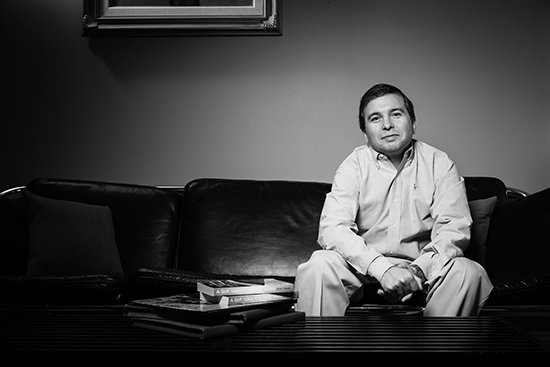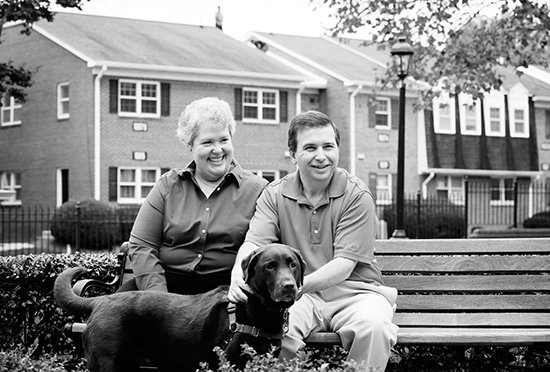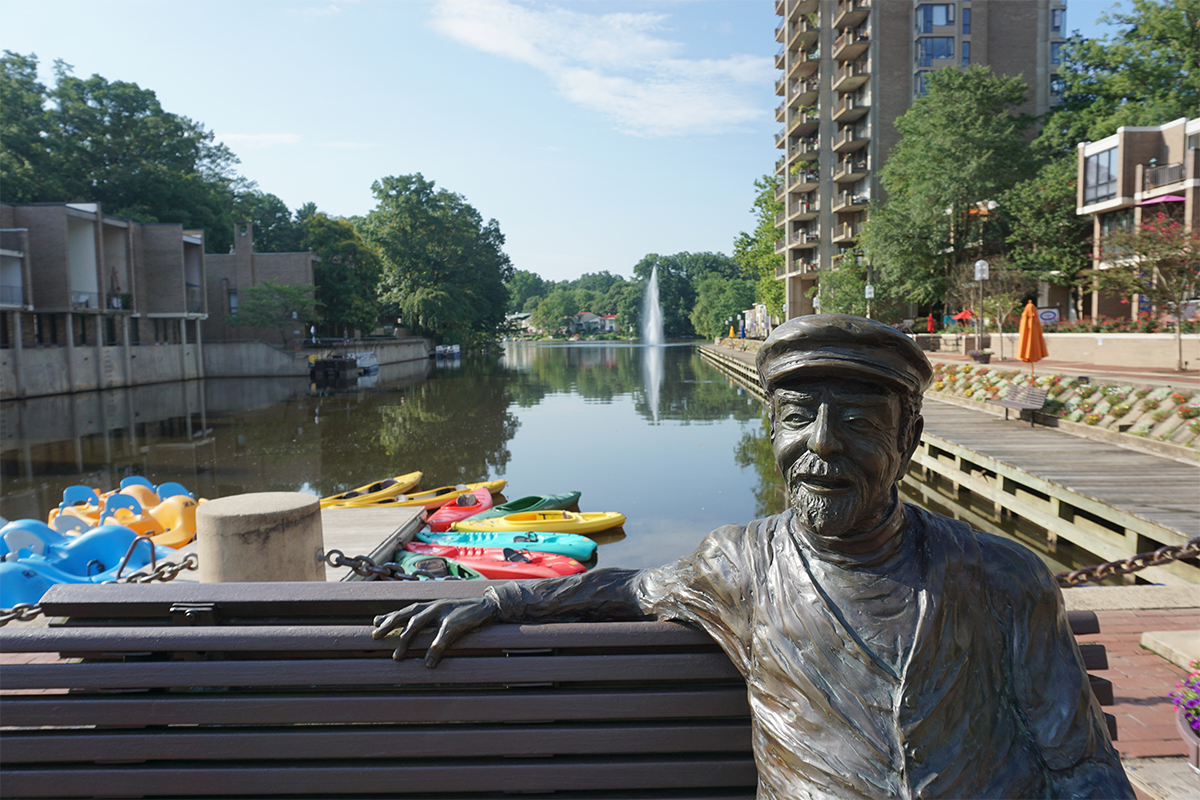
By Helen Mondloch • Photography By Erick Gibson
“I can walk funny for you.”
Such was Karl Robb’s offer to a ticket collector who was eyeing him suspiciously aboard a crowded New York City train. Robb had just explained his reason for occupying a seat in the train’s handicapped section: “I have Parkinson’s Disease”—to which the leery worker had replied, “Can you prove it?”
While Robb doesn’t like to dwell on the downsides of living with Parkinson’s, the occasional run-in with human callousness is clearly one of them. In his 25 years of combating this progressive disease of the nervous system, Robb has encountered insensitivity, some of it quite breathtaking, in places like train stations, airports and even doctor’s offices.
It’s just one of the challenges that the 48-year-old Fairfax resident has learned to soldier since his legs began to tremble and his speech began to falter when he was 17 and attending high school in Raleigh, North Carolina. As a college student studying English at the University of North Carolina at Chapel Hill, the mysterious symptoms continued to come and go unpredictably. After graduating, during a winter he spent working at a ski shop in Aspen, Colorado, the symptoms grew so pronounced that he sometimes walked like a hunchback and clung to inanimate objects for stability. People sometimes asked if he’d been drinking. (And sometimes, just to avoid trying to explain the unexplainable, he would lie and say “yes.”) Doctor’s visits provided no answers—only more frustration. One doctor, theorizing that Robb was suffering from the effects of stress, advised him to “chill out and have a beer.” At age 24, Robb became a medical rarity: one of the few young adults to receive a diagnosis of Parkinson’s disease (PD), a condition generally reserved for people over 60.
The diagnosis marked the beginning of Robb’s passionate crusade for wellness—his own and that of some six million fellow PD patients worldwide. More than two decades later, he is still discovering and promoting ways to cope with PD’s significant challenges, including phenomena like festination (the involuntary quickening of the gait in which the torso propels forward) and dyskinesia (telltale rapid, dance-like motions of the head and limbs)—staples of the PD lexicon.
Robb is driven by a vivid awareness that the illness brings not only physical challenges but mental and emotional ones—a fact highlighted by the tragic suicide of Robin Williams last August, after it was revealed that a recent diagnosis of Parkinson’s may have intensified the famed actor’s longstanding battle with depression. In an article Robb wrote for New Republic, he paid tribute to Williams while doing what he often does—seizing the chance to educate readers about Parkinson’s and offering reassurance to those suffering with it: “It may make you alter your life and … reprioritize your goals, but it doesn’t have to demolish you.”
Robb himself provides living proof that a PD patient can lead a passionate and productive life. He is a writer, entrepreneur, inventor, avid photographer and prolific doodler—the sort of person whose wheels are always spinning. Together with wife Angela, his devoted partner in this crusade, he travels the country on speaking engagements for various Parkinson’s organizations. He serves on the board for the Parkinson’s Action Network (PAN) and volunteers here in Virginia as PAN’s assistant state director. The pair is also immersed in the power of touch—teaching and practicing Reiki, an ancient healing technique that Robb credits with helping him avert PD’s more debilitating effects.
Robb tells his story and pitches his ideas to fellow Parkinsonians in a book published in 2011 “A Soft Voice in a Noisy World: A Guide to Dealing and Healing with Parkinson’s Disease.” The book grew out of his blog and offers an abundance of practical advice and spiritual affirmations.
The book’s Forward, written by acclaimed journalist Bill Moyers, extols Robb’s saga as “a story of the hero’s journey”—a reference to the subject of the well-known PBS series that Moyers once produced with classic mythology scholar Joseph Campbell. Moyers notes that the late professor defined hero as “a man or woman who has battled past limitations, beyond obstacles and seeming defeats, to seek and discover, in the primary springs of life, the power of transfiguration—and because of that journey, to help others by sharing hard-won knowledge and wisdom.”
“Karl Robb,” declares Moyers, is precisely “such a hero.”
“I am not like everyone else.”
With his slim build and placid facial features, Robb’s appearance belies his age. He looks not much older than the young man featured in an old still-photo dating back to his days as an avid outdoorsman. It’s an image that was displayed on CBS News when he appeared in a televised interview about stem cell research back in 2006. Sporting wilderness gear and a boyish grin, the twentysomething Robb is sprawled out on a large rock with careless abandon. Some 30 years later, PD has somehow bestowed him with a Peter Pan-like resistance to wrinkles and other outward signs of aging—one of the more mysterious effects of the disease.
Robb had barely entered the prime of his youth when PD upended the course of his life. The diagnosis came after an unforgettable hiking venture during the summer of 1990, the year he graduated from college. Along the wilderness trails of the Blue Ridge Mountains in western North Carolina, he came face to face with a stark reality: he could no longer deny that something was terribly wrong.
Until now Robb had managed his intermittent symptoms with relative success. Neither the sudden episodes of shaking in his extremities, nor the stiffening of his whole body, nor the bouts of illegible handwriting had prevented him from earning good grades or pursuing his interests. He had played on his high school’s tennis team for a year and still skied. He was completely unprepared for what he describes in his book as “the most humiliating and most enlightening” experience of his life—an expedition called Outward Bound. He had enlisted in the rigorous week-long journey at the encouragement of his father, who believed, ironically, that the challenge would build his son’s confidence.
Anyone reading Robb’s recollection might come away convinced that an Outward Bound venture would likely prove miserable even for a person not plagued by neurological problems. Given the erratic weather patterns in the region where the hike took place, all but the most hardened survivalist might suffer defeat in the face of treacherous rocky terrain, menacing mosquitos and regular torrential downpours.
For a young man trapped unknowingly in the grip of a progressive disease, the challenges became insurmountable. A few days into the journey, the group leaders, alarmed by Robb’s struggles with festination and locked knees, among other frequent setbacks, pulled him aside and informed him that he could no longer participate in the expedition. He posed a danger to himself and others, they said gravely. Devastated by a sense of failure—a feeling heightened by the maudlin sympathies expressed by other campers—Robb recalls that “for the next few days, I faced my first and only bouts of depression and anxiety over my condition.” The episode compelled a need for answers and also brought a lasting revelation: “The truth was that I am not like everyone else, and I had to learn to accept that reality. As a person with Parkinson’s, I have to accept that fact on a daily basis.”

Maddening Medical Encounters
Back home, Robb’s quest for answers drove him to visit a movement disorder specialist at what he calls a “prestigious southern medical school.” The doctor scoffed when Robb asked if the culprit might be PD. “People your age just don’t get Parkinson’s disease,” he insisted.
Eight months and seven doctors later, Robb finally got an answer that confirmed his educated hunch. An endless barrage of tests, including an all- important MRI, delivered him from the anguish of uncertainty. Even more liberating was the knowledge that he did not have what he had imagined—a deadly brain tumor.
Still, Robb and his family had to cope with the gravity of the news and the legion of scary questions it raised. Adding insult to injury was the astonishing callousness with which the diagnosis was rendered by “Doctor 7.” (To convey the cold, impersonal manner often displayed by doctors, Robb sometimes refers to them using numerals.) On a late Friday afternoon, Robb recalls being consumed with agony after Doctor 7 failed to phone him as promised with crucial test results. When Robb’s father phoned the office, he was told the doctor was out. “A nurse, lacking any smidgen of tact, told my father matter-of-factly, ‘We’re treating him for Parkinson’s disease,’” Robb recalls.
It was not the last time he would encounter tactlessness on the part of a medical professional. Others would follow at close range, treating him not as a person, but “as an intriguing case study and lab experiment, an anomaly, or a personal challenge.”
The most maddening encounter—one that could have spelled disaster if not for Robb’s astute self-advocacy skills—occurred some ten years later. In his early thirties, Robb was still adapting to PD’s effects, which can vary widely from hour to hour. To ease the stresses of his disease, Robb had taken up meditation, a practice he still embraces. But when his heart and mind began racing uncontrollably one Sunday afternoon, even his trusted relaxation technique could not calm him down. The episode prompted a doctor’s visit that led him to an aging cardiologist he calls Dr. Grandpa—a nickname employed without affection. Dr. Grandpa grew frustrated and furious when Robb failed to keep pace with an inclined treadmill during a stress test. He hastily diagnosed a heart disorder, apparently never stopping to consider that the palpitations might be a by-product of Robb’s medication—a crucial fact subsequently brought to light by a more thoughtful diagnostician whom Robb consulted for a second opinion. Worse, the dismissive Dr. Grandpa prescribed a potentially lethal drug. “It amazes and perplexes me, but had I not gotten a second look at my condition, I could have done massive harm to myself—perhaps even died,” says Robb.
The story serves as a powerful cautionary tale for both patients and doctors. Just as powerful is the gratitude he expresses for the gentle saving graces of the late Dr. Bill Koller, a specialist in Kansas City, and Dr. Linda Sigmund, his neurologist of 15 years who recently retired. Robb’s advice to less sensitive physicians is simple: How about adopting the bedside manner of a human being?
Keeping Perspective
But Robb has clearly learned to keep callousness in perspective. He is not the only PD patient who’s been put through the ringer at the doctor’s office, or who gets interrogated on trains. When boarding planes, he knows his movements might evoke strange looks and giggles from TSA agents who have no idea what it’s like to live with a cruel, degenerative condition.
Robb recalls that even famed Parkinsonian Michael J. Fox, whom he once met at a PAN conference, faced down mockery from conservative commentator Rush Limbaugh. After Fox appeared in a 2006 television commercial endorsing a Congressional candidate who supported stem cell research, Limbaugh accused the actor of exploiting his illness for political gain. With regard to the telltale spasms Fox displayed in the commercial, Limbaugh postulated that Fox was either “exaggerating” his lack of muscle control or had deliberately refrained from taking his medication that day. Limbaugh went so far as to mimic Fox’s erratic movements, a theatrical display that swiftly went viral. Nevermind, says Robb, that the flailing (dyskinesia) is actually a side effect of medications used to treat PD, not a symptom of the disease itself. He smiles with last-laugh satisfaction as he notes that donations to the Michael J. Fox Foundation surged in the wake of Limbaugh’s stunning show of ignorance.
Better Angels
Against many odds, Robb has managed to withstand cynicism. His resilience is clearly fed by a host of luminous forces, including the cast of better angels with whom he surrounds himself—family and friends who are unfazed by his stutter and occasional stiffening, who appreciate his many gifts. The star player is Angela, his wife of 18 years. Bill Moyers calls her “another hero of this story.”
The couple met in an online chat room back in 1994, when she worked as a web publisher. She laughs when recalling the full disclosures they exchanged before meeting in person for the first time. (She struggled with her weight, while he had this problem called Parkinson’s disease.)
At the Robbs’ Fairfax townhome, where they live with a one-eyed cat named Shadow and an exuberant chocolate lab named Lily, team work abounds. Angela, 42, helps manage her husband’s entrepreneurial ventures, which include several patented inventions. One is a finger-tip stylus that he devised back in the ‘90s and is still in use as an accessory for voting machines.
When it comes to Parkinson’s, Angela sounds like a health care professional as she expounds dopamine deficiency and other biochemical underpinnings. She throws glances at the kitchen calendar, which reveals a busy schedule of engagements—everything from board meetings to support groups—the kind of outreach that’s earned the couple recognition and awards for outstanding service. Occasionally the two appear before Congress or in the media. In their interview on CBS, Angela projected a somber passion as she pleaded the case for stem cell research. Referring to the millions of Americans suffering from PD and other chronic illnesses, she urged, “[Shouldn’t we] … provide them with whatever resources we can to help find either therapies or a cure for their diseases?”
For the past 15 years the Robbs have also cultivated a shared passion for Reiki, a hands-on wellness technique that hails from ancient Buddhist tradition. In the process they have become deeply involved in a loving community of fellow practitioners. As Reiki Masters, they give and receive the treatment (which differs from massage in both principle and method; Reiki does not involve the removal of clothes, for instance); they teach the technique to others; and they refine their skills by attending regular Reiki retreats. Their efforts are richly rewarded, they say. Robb regards Reiki as the single most important key to his wellness—one that he is convinced has slowed and possibly reversed PD’s progression.
In “A Soft Voice in a Noisy World,” Robb devotes several pages to recounting how he met the man who introduced him to Reiki back in 1998—a chance encounter that proved so pivotal, it inspired his belief in destiny. After Robb’s father found relief from a painful injury through an alternative therapy called Trager, he recommended that his son look into it. A few phone calls later, Robb learned that a man named Gilbert Gallego, a practitioner of the healing arts, was about to move his office to a Fairfax location just up the street from the Robbs’ house. Gallego was a former marathon runner, a retired army ranger, and colonel who had spent 14 years fighting guerillas and drug wars in Central and South America, a career that left him severely traumatized in body and spirit. Inspired by indigenous holistic healers he had met on his deployments, he took up the study of time-honored alternative therapies, including Reiki. “It was Reiki that gave him back his legs and his life,” says Robb. By the time Robb picked up the phone to call him, Gallego was a Reiki Master with some six years’ experience in treating patients. Nonetheless, Robb was deeply skeptical when the time came to mount the treatment table. “I thought—this is kooky stuff,” he recalls. But after just one Reiki session, he experienced such renewal that he returned for more. Robb’s friendship with Gallego blossomed, and so did his devotion to Reiki, which he now champions to fellow PD patients as a simple, inexpensive, and non-invasive procedure that offers great promise. Recently, Robb stood as a witness at Gallego’s wedding in Costa Rica.
Bill Moyers points out that Karl Robb’s story is extraordinary because he has “refused futility’s embrace,” finding instead “the resources to cope, reasons to fight on, and strength to persist.” Robb continually inspires others to push past limitations of their own—and that, says Moyers, is the ultimate reward of this hero’s journey.
(December 2014)




